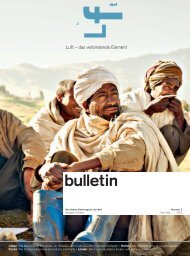Healthcare
Entering the digital era Global Investor, 02/2012 Credit Suisse
Entering the digital era
Global Investor, 02/2012
Credit Suisse
- No tags were found...
You also want an ePaper? Increase the reach of your titles
YUMPU automatically turns print PDFs into web optimized ePapers that Google loves.
GLOBAL INVESTOR 2.12 — 07<br />
Switzerland<br />
82 years<br />
7,810 USD<br />
Russian Federation<br />
68 years<br />
525 USD<br />
South Africa<br />
52 years<br />
650 USD<br />
Burkina Faso<br />
50 years<br />
40 USD<br />
United Kingdom<br />
80 years<br />
3,502 USD<br />
Does more money mean better health?<br />
Spending on healthcare (red) is loosely correlated to life expectancy<br />
(blue). Rich countries tend to have high life expectancies. Life is<br />
shorter in poor countries like Burkina Faso, where many die of malaria,<br />
and in South Africa, where 17.8% of people are infected with<br />
HIV. But many factors come into play. The question is not simply<br />
how much money is spent on healthcare per capita. People live to<br />
similar ages in Japan, the USA, Cuba, Switzerland and the UK. But<br />
the UK spends 14 times more per capita than Cuba. <strong>Healthcare</strong><br />
spending as a percentage of GDP also does not explain a country’s<br />
success. Spending is almost equal in South Africa (8.9%) and the<br />
UK (9.6%), but the outcomes for health and life expectancy are<br />
<br />
(91.5%) might appear to be the secret formula for a low-cost long<br />
life. Yet the state also pays the lion’s share in the British system<br />
(83.9%), which is nearly six times more expensive. Costs are also<br />
high in the US system, where public spending amounts to 53.1%<br />
of healthcare expenditures. Source: World Bank

















